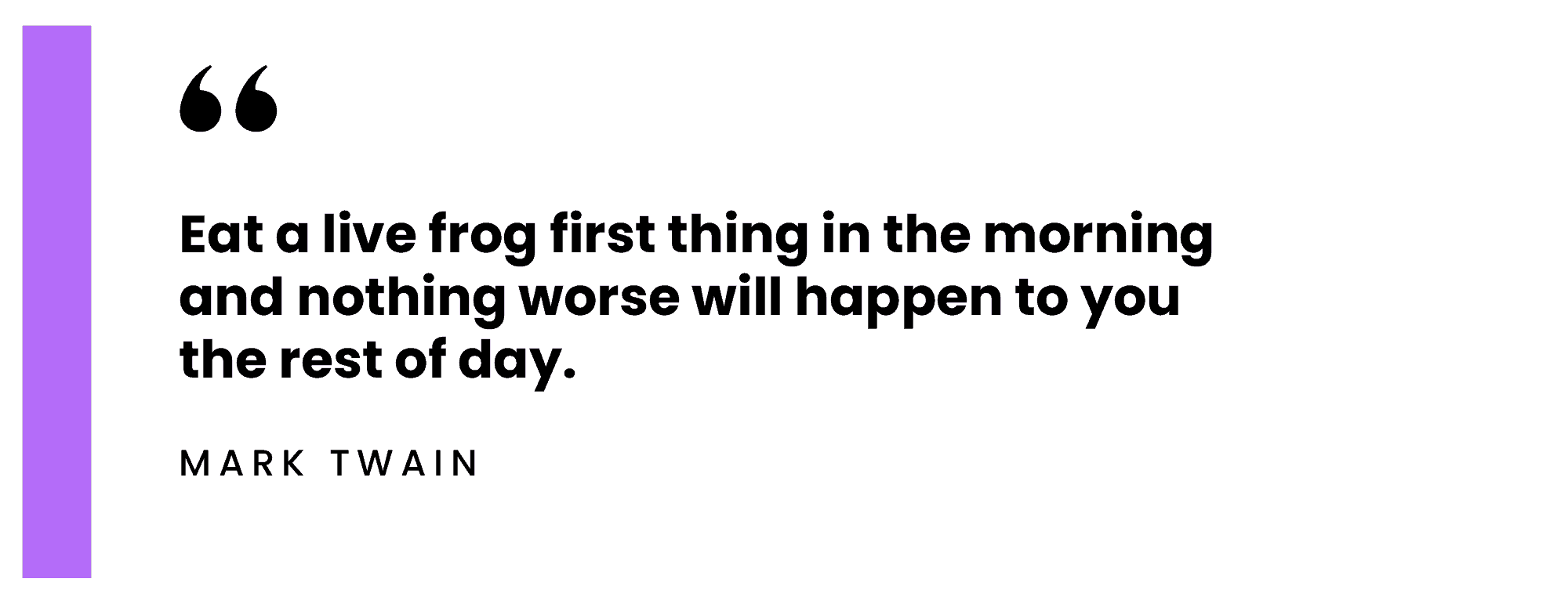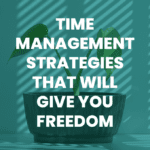Table of Contents
What is the one thing you need to succeed in life?
It’s not money, or fame, or luck (though these things can certainly help). It all comes down to one thing:
Self discipline.
Without the ability to make yourself do the things in life that are necessary but annoying, painful, boring, or tiring, you’ll end up spinning in circles.
Learning to be disciplined isn’t easy—but mastering this skill can make magic happen.

The habits and activities in this article can help. Try putting these into practice, and soon you’ll find your powers of self discipline getting stronger.
What is self discipline?
The meaning of self discipline
Self discipline means controlling your impulses and temptations in order to achieve something necessary, good, or beneficial.
It can be tricky to define self discipline because it can take so many forms.
Right now, I’m looking at my Nintendo Switch and thinking it wouldn’t hurt just to check on my Animal Crossing island, even though I have deadlines today.
I’m also thinking about that amazing croissant I had yesterday and wondering if I should pick up another one to treat myself.
I also need to go grocery shopping and clean my apartment before I have friends over, but I really don’t want to…
These moments happen to everyone, every single day.
Self discipline happens when you say no to the things you want while saying yes to the things you need:
I need to get paid, which means I need to finish my work on time, so Animal Crossing will have to wait.
I need to feel healthy to be happy, and I know another croissant isn’t going to help me feel that way, despite how delicious it would be in the moment.
I need to feel comfortable and relaxed when I’m with friends, which means I’ve got to tidy up and get supplies before they arrive.
By practicing self discipline, I’m causing myself a little bit of disappointment now because I know that I’ll be happier in the long run if I do what must be done.
Little things, like saying no to a croissant, aren’t that difficult. But there are harder things in life that require self discipline, too: having a difficult conversation with a loved one, paying taxes on time, quitting smoking, or leaving a well-paying job because it’s toxic. These things are challenging but beneficial, and without self discipline they’re simply not achievable.
A lack of self discipline can cause big problems in life. But when you learn how to practice it, the payoff is immense.
The benefits of self discipline
An easier path to success

More time for what you love
It may not seem like it, but practicing self discipline also means you’ll have more time in your week to do what you love—whether that’s hanging out with friends, practicing a hobby, or watching Netflix on the couch. Instead of wasting time putting off the unpleasant tasks that have to happen at some point, you’re diving right in, crossing them off your list sooner, and adding time back into your day.
Overcoming bad habits
Everyone has bad habits we’d be better off without. But breaking a habit, even if you know it’s in your best interest, is hard work. Self discipline is the only way to get past your bad habits to feel healthier and happier.
Deeper feelings of accomplishment and satisfaction
Often, the things that require the most self discipline will bring the greatest rewards later on. For example: Making yourself work weekends now means you can launch your freelance business sooner and achieve your dream of being a digital nomad. (I’m pulling this one from personal experience.) Today’s pain is tomorrow’s gain.
Career success
Ask any hiring manager, and they’ll tell you self discipline is one of the most desirable soft skills. People love working with others who are self-directed, proactive, and driven—and they loathe working with people who procrastinate, get distracted, and fail to deliver.
Even if you plan to work for yourself as an entrepreneur or freelancer, you’ll still need self discipline to get by—perhaps even more so, since you won’t have others reminding you about what needs to be done.
Either way, without self discipline, your career will move slower or stall out completely. But with it, you’ll be much faster at building a career that brings you long-term happiness.
How to be more self disciplined: 8 methods that work
Get serious about time management strategies

So much of self discipline has to do with how you manage your time. Being able to prioritize, stay on top of your tasks, and carve out time for downtime and self-care will determine whether you can achieve your goals or not.
I’ve written an entire article on time management strategies, and it’s definitely worth reading through before you start your self discipline journey.
Carve out “sacred time” for work and play
Sometimes, self discipline is as easy as a change in attitude. If you’re struggling to achieve goals because you give in to temptation or procrastination, try changing how you think about your time.
Personally, I use the words “sacred time” to designate the hours throughout my week that I will absolutely, 100% do something—whether it’s something I want to do or something I’m dreading.
If you have an unpleasant work task to take care of, it’s a lot easier to tackle it when you’ve blocked off specific time for it in your calendar.
When it comes to things you enjoy, marking off sacred time can give you comfort that, at some point, you’ll get to do what you want. With that light at the end of the tunnel, taking care of the things you need to do becomes a lot easier.
Try eating the frog

The act of “eating the frog” requires self discipline—you must say to yourself, “I’m going to take care of this NOW, even though I don’t want to.” But keep Mark Twain’s advice in mind—when you take care of that big ugly task right away, you’ll have all the easy, delightful stuff waiting for you on the other side.
Identify and mitigate your distractions

There’s no getting around it—distractions are one of the biggest obstacles when learning how to be more disciplined. Our phones, the TV, social media, staring into space… it’s easy to slip into these easy distractions when we’re faced with something challenging or uncomfortable.
The first step to minimizing distractions is learning what they are. When you fall behind on a task or find yourself procrastinating, reflect on what distractions got in your way. Did you spend an hour scrolling through Instagram when you should have been polishing your LinkedIn profile? Did you have Reddit open in a tab when you should have been studying?
Once you know what your distractions are, you can find ways to mitigate them. My favorite tactic is charging my phone in my bedroom when I’m working from home—it stops me from reaching for it every few seconds to distract myself. You can also monitor your screen time or use apps like ForestApp to help you stay focused.
Practice a self-rewards system (instead of punishment)
When you fail to be self disciplined, try not to be hard on yourself. Be wary of thoughts like this: “Why am I so weak that I can’t even get this project done?”
That kind of thinking is only going to make things worse—you will start to see your moments of weakness as impossible shortcomings, and routinely berating yourself will make you less motivated overall.
On the flip side, offering yourself a reward for doing something difficult can work wonders. For example, if you’re trying to get more fitness into your day (but like me, you kind of hate it), you can make yourself a promise: “If I go to the gym this afternoon, tonight I’ll watch two episodes of my favorite show.” That kind of trade-off is much more motivating than something like, “If I don’t go to the gym today, I’ll go for two hours tomorrow.”
The phrase “treat yourself” is all about taking a reward after doing something challenging (or boring but necessary). Indulge and enjoy rewards for your hard work, and you’ll make faster progress toward your goals.
Breaks are friends, not failures

A warning: Self discipline can become a slippery slope to burnout. Because self discipline requires you to push yourself, you can easily overwork yourself until all of your hard work becomes pointless.
To really master self discipline, you also need to practice self-care—take breaks from work, schedule alone time and social time, and do some things purely for enjoyment, not because they are moving you toward your greater goals.
You can use the “sacred time” strategy above to make sure this happens. For example, if you’re a contractor managing your own workload, choose two days a week when you absolutely will not log in to your email. Make sure your clients or customers know about this, and use that time to do whatever the heck you want.
Find an accountability partner
This strategy has worked wonders for me as a freelancer and entrepreneur—self discipline is so much easier when you have a partner to report to.
All you need for this strategy is a friend or colleague who shares a similar desire to achieve goals and get things done. Make an appointment with them (I meet with mine every other week), when you’ll briefly run through everything you’ve accomplished since you last talked.
This will lead to a sort of mental trick—when you’re thinking of putting off something you need to do, you’ll remember that you want to have something to report on your next accountability call. That alone can make it much easier to focus on the necessities and put the distractions away.
Stay focused on your big goals

Practicing self discipline can feel a lot like you’re only focusing on little things—don’t have that third drink, don’t forget to go to yoga class, don’t let TikTok distract you from what matters.
Don’t let these moments distract you from the big goal—whatever it is that is motivating you to get sh*t done.
Try this—take 10 or 15 minutes to write out your big life goals. Things like:
- I want to start my own business
- I want to stop worrying about money
- I want to spend more time with friends and family
- I want to travel the world
Now get out a highlighter, and assign each goal a color. Next, take out your to-do list, and assign all of your little tasks a color corresponding to the big goal they’re helping you achieve.
Sending those emails today is a small step toward getting a promotion and earning more money.
Tackling your homework tonight means you’ll be able to go to the movies with your friends tomorrow night.
Saving your money instead of spending it on something frivolous means you’ll have more to spend on your trip to Portugal next summer.
These big goals will be your driving factor to becoming more self disciplined.
No one said self discipline is fun—but it does help you achieve your goals and build a more satisfying life. Remember to be kind to yourself on this journey, and with these strategies in your pocket, you’ll be well on your way to the mastery of this tricky skill.



